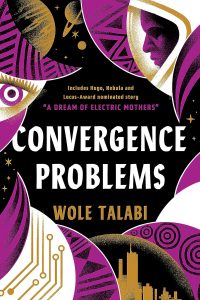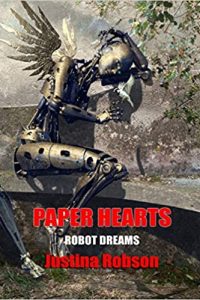Gary K. Wolfe Reviews Convergence Problems by Wole Talabi
 Convergence Problems, Wole Talabi (DAW 978-0756418830, $27.00, 320pp, hc), February 2024.
Convergence Problems, Wole Talabi (DAW 978-0756418830, $27.00, 320pp, hc), February 2024.
After the exuberant fantasy/heist caper that was his debut novel Shigidi and the Brass Head of Obalufon, it might be easy to overlook Wole Talabi’s background as an engineer and SF writer. His new collection, Convergence Problems, serves as a rewarding reminder of his connections to more-or-less traditional SF themes and techniques. A story like ‘‘Blowout’’, which concerns an underground disaster on Mars and the efforts of an orbiting supervisor to save the endangered explorers, might have been at home in the old Astounding, while ‘‘Gamma (Or: Love in the Age of Radiation Poisoning)’’ is a brief love story set in the sort of radioactive wasteland that haunted post-WWII SF. In an interview a few years ago, sounding almost like Asimov, Talabi said ‘‘Most writers I know focus on character and theme. But for me, the idea comes first, and everything else is secondary.’’ In a few cases, this seems evident: the rather witty ‘‘Debut’’, in which AIs set out to create art that (it turns out) appeals only to other AIs, resulting in worldwide online chaos as the AIs begin acting like distracted fans, reads in part like a report of a thought experiment, and ‘‘Performance Review’’ focuses in chilling form on a kind of invasive technology called ‘‘employmetrics’’ that monitors and increasingly controls the brains of corporate employees.
But this doesn’t mean that Talabi isn’t interested in character or culture, with both playing an important role in nearly all the stories here. The orbiting supervisor in that Martian story ‘‘Blowout’’, is the sister of one of the endangered explorers, and a family backstory lends more than a sentimental edge to the crisis. ‘‘An Arc of Electric Skin’’, which begins with an experiment to increase the electrical conductivity of human skin, ends as a radicalized test subject uses it to make a dramatic political statement. ‘‘Embers’’, one of three stories original to the collection, posits a new form of renewable energy using biotech cells, but focuses on a disillusioned worker whose education and future prospects were cut short when the petroleum industry, which had been an engine of Nigeria’s economy, dried up overnight. Now, since the new energy grid has not yet reached his village, he sets out single-handedly to resurrect a long-abandoned refinery in hopes of redeeming himself as a local hero. Almost painfully sad, the story achieves a real sense of tragedy.
A couple of stories are set in huge megastructures reminiscent of the sort we used to see in arcology fictions like Silverberg’s The World Inside, only in each case Talabi finds what feels like a uniquely Nigerian angle. ‘‘Nigerian Dreams’’, set in ‘‘the 856th level of the monolithic Biafra-5 supercity,’’ is largely a discussion between two characters debating the Nigerian Dream, one arguing that it’s a ‘‘made-up country. Invented for colonial convenience’’ and insisting that the Nigerian dream is simply to leave Nigeria, while the other hopes to ‘‘thrive in Nigeria, in the chaos.’’ Though brief, the story implies a larger debate over national identity. ‘‘Ganger’’ – an original novella – juxtaposes its future megacity with an actual tale from Yoruba folklore. A young girl whose suicide attempt is foiled by the invasive behavioral technology of the city finds some hope of freedom when she meets a self-styled revolutionary, who shows her how to temporarily transfer her consciousness to an unmonitored service droid. In the parallel folktale, an aging hunter is granted the ability to temporarily transfer his mind into animals. Both stories lead to predictable ends, but Talabi’s version of a sterile utopia, growing to massive proportions because of climate refugees, is vivid and memorable.
Throughout the collection, Talabi finds intriguing ways of linking his SF ideas to Nigerian traditions and culture. The Hugo- and Nebula Award-nominated ‘‘A Dream of Electric Mothers’’ is set in a distant future in which ‘‘the mass archiving of memrionic copies of our citizens,’’ results in a collective ‘‘supercitizen’’ that ‘‘could process billions of input parameters, thoughts, opinions, experiences and feelings in an instant and give advice on matters of national interest.’’ But in the minds of many of the characters, this is merely a tech version of consultation with one’s ancestors, and the narrator even sets out to see if he can tease out a single ancestral mind from the collective archive. ‘‘Tends to Zero’’ involves a dissolute young man’s confrontation with the personification of Lagos (a bit reminiscent of N.K. Jemisin’s The City We Became), while ‘‘Abeokuta 52’’ is in the form of a web discussion debating whether alien technology discovered in Nigeria is a curse or a blessing, perhaps echoing Nigeria’s own historical grappling with the uses of its natural resources. And fans of Shigidi and the Brass Head of Obalufon will be pleased to find that fantasy hasn’t been forgone entirely; ‘‘Saturday’s Song’’, a kind of sequel to his award-winning ‘‘Wednesday’s Story’’ – both involve personified days of the week telling tales – is a tragicomic love story involving a young woman named Saura and her encounters with Shigidi. It serves as a reminder that, while Convergence Problems mostly celebrates the SF ideas that Talabi is clearly fond of, he’s equally at home with a broad range of fantastic tales, and his thoughtful introduction and story notes make this even more clear (as well as explaining that title). Perhaps the highest compliment I can pay to Talabi’s collection is that it leaves us with no idea of what to expect from him next.
Gary K. Wolfe is Emeritus Professor of Humanities at Roosevelt University and a reviewer for Locus magazine since 1991. His reviews have been collected in Soundings (BSFA Award 2006; Hugo nominee), Bearings (Hugo nominee 2011), and Sightings (2011), and his Evaporating Genres: Essays on Fantastic Literature (Wesleyan) received the Locus Award in 2012. Earlier books include The Known and the Unknown: The Iconography of Science Fiction (Eaton Award, 1981), Harlan Ellison: The Edge of Forever (with Ellen Weil, 2002), and David Lindsay (1982). For the Library of America, he edited American Science Fiction: Nine Classic Novels of the 1950s in 2012, with a similar set for the 1960s forthcoming. He has received the Pilgrim Award from the Science Fiction Research Association, the Distinguished Scholarship Award from the International Association for the Fantastic in the Arts, and a Special World Fantasy Award for criticism. His 24-lecture series How Great Science Fiction Works appeared from The Great Courses in 2016. He has received six Hugo nominations, two for his reviews collections and four for The Coode Street Podcast, which he has co-hosted with Jonathan Strahan for more than 300 episodes. He lives in Chicago.
This review and more like it in the February 2024 issue of Locus.
 While you are here, please take a moment to support Locus with a one-time or recurring donation. We rely on reader donations to keep the magazine and site going, and would like to keep the site paywall free, but WE NEED YOUR FINANCIAL SUPPORT to continue quality coverage of the science fiction and fantasy field.
While you are here, please take a moment to support Locus with a one-time or recurring donation. We rely on reader donations to keep the magazine and site going, and would like to keep the site paywall free, but WE NEED YOUR FINANCIAL SUPPORT to continue quality coverage of the science fiction and fantasy field.
©Locus Magazine. Copyrighted material may not be republished without permission of LSFF.






